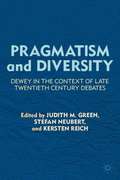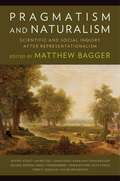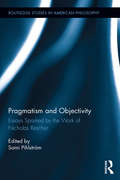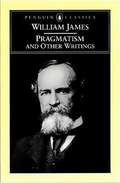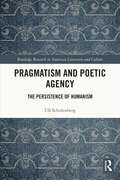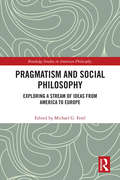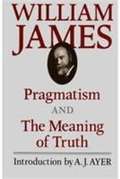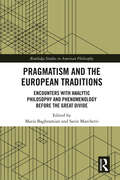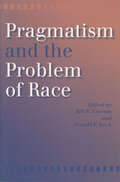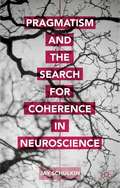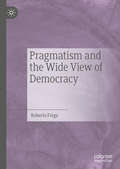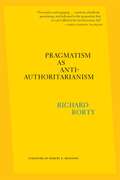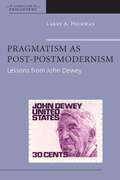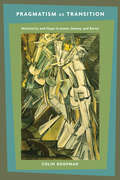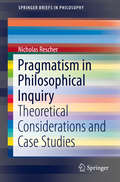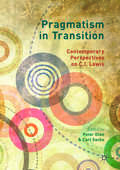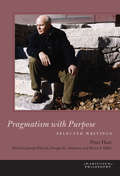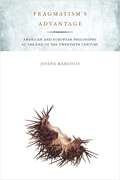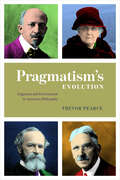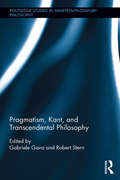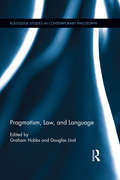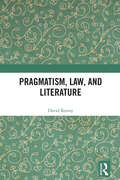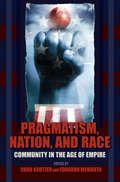- Table View
- List View
Pragmatism and American Experience
by Joan RichardsonPragmatism and American Experience provides a lucid and elegant introduction to America's defining philosophy. Joan Richardson charts the nineteenth-century origins of pragmatist thought and its development through the twentieth and twenty-first centuries, focusing on the major first- and second-generation figures and how their contributions continue to influence philosophical discourse today. At the same time, Richardson casts pragmatism as the method it was designed to be: a way of making ideas clear, examining beliefs, and breaking old habits and reinforcing new and useful ones in the interest of maintaining healthy communities through ongoing conversation. Through this practice we come to perceive, as William James did, that thinking is as natural as breathing, and that the essential work of pragmatism is to open channels essential to all experience.
Pragmatism and Diversity
by Kersten Reich Stefan Neubert Judith M. GreenDiversity is an unavoidable aspect of twenty-first century living. The authors in this volume engage in cross-difference conversations with other thinkers from earlier periods and other philosophical traditions in order to reconstruct pragmatism and cosmopolitanism in ways that are more attuned to our lived experience of diversity.
Pragmatism and Naturalism: Scientific and Social Inquiry After Representationalism
by Scott Davis Jeffrey Stout Philip Kitcher Wayne Proudfoot Matthew C. Bagger Professor Nancy Frankenberry Terry Godlove Jonathon Kahn Michael Raposa Jim WetzelMost contemporary philosophers would call themselves naturalists, yet there is little consensus on what naturalism entails. Long signifying the notion that science should inform philosophy, debates over naturalism often hinge on how broadly or narrowly the terms nature and science are defined. The founding figures of American Pragmatism—C. S. Peirce (1839–1914), William James (1842–1910), and John Dewey (1859–1952)—developed a distinctive variety of naturalism by rejecting reductive materialism and instead emphasizing social practices. Owing to this philosophical lineage, pragmatism has made original and insightful contributions to the study of religion as well as to political theory.In Pragmatism and Naturalism, distinguished scholars examine pragmatism’s distinctive form of nonreductive naturalism and consider its merits for the study of religion, democratic theory, and as a general philosophical orientation. Nancy Frankenberry, Philip Kitcher, Wayne Proudfoot, Jeffrey Stout, and others evaluate the contribution pragmatism can make to a viable naturalism, explore what distinguishes pragmatic naturalism from other naturalisms on offer, and address the pertinence of pragmatic naturalism to methodological issues in the study of religion. In parts dedicated to historical pragmatists, pragmatism in the philosophy and the study of religion, and pragmatism and democracy, they display the enduring power and contemporary relevance of pragmatic naturalism.
Pragmatism and Objectivity: Essays Sparked by the Work of Nicholas Rescher (Routledge Studies in American Philosophy)
by Sami PihlströmPragmatism and Objectivity illuminates the nature of contemporary pragmatism against the background of Rescher’s work, resulting in a stronger grasp of the prospects and promises of this philosophical movement. The central insight of pragmatism is that we must start from where we find ourselves and deflate metaphysical theories of truth in favor of an account that reflects our actual practices of the concept. Pragmatism links truth and rationality to experience, success, and action. While crude versions of pragmatism state that truth is whatever works for a person or a community, Nicholas Rescher has been at the forefront of arguing for a more sophisticated pragmatist position. According to his position, we can illuminate a robust concept of truth by considering its links with inquiry, assertion, belief, and action. His brand of pragmatism is objective and organized around truth and inquiry, rather than other forms of pragmatism that are more subjective and lenient. The contingency and fallibility of knowledge and belief formation does not mean that our beliefs are simply what our community decides, or that truth and objectivity are spurious notions. Rescher offers the best chance of understanding how it is that beliefs can be the products of human inquiry yet aim at the truth nonetheless. The essays in this volume, written by established and up-and-coming scholars of pragmatism, touch on themes related to epistemology, philosophy of mind, philosophy of science, and ethics.
Pragmatism and Other Writings
by William JamesThe writings of William James represent one of America's most original contributions to the history of ideas. Ranging from philosophy and psychology to religion and politics, James composed the most engaging formulation of American pragmatism. 'Pragmatism' grew out of a set of lectures and the full text is included here along with 'The Meaning of Truth', 'Psychology', 'The Will to Believe', and 'Talks to Teachers on Psychology'.
Pragmatism and Poetic Agency: The Persistence of Humanism (Routledge Research in American Literature and Culture)
by Ulf SchulenbergPragmatism is a humanist philosophy. In spite of the much-debated renaissance of pragmatism, however, a detailed discussion of the relationship between pragmatism and humanism is still a desideratum. It is difficult to understand the complexity of pragmatism without considering the significance of humanism. At least since the 1970s, humanism, mostly in its liberal version, has been vehemently attacked and criticized. In pragmatism, however, a particular understanding of humanism has persisted. Bringing literary studies, philosophy, and intellectual history together and establishing a transatlantic theoretical dialogue, Pragmatism and Poetic Agency endeavors to elucidate this persistence of humanism. Schulenberg continues the thought-provoking argument he developed in his previous two monographs by advancing the idea that one can only grasp the unique contemporary significance of pragmatism when one realizes how pragmatism, humanism, anti-authoritarianism, and postmetaphysics are interlinked. If one appreciates the implications and consequences of this link, then one is in a position to see pragmatism’s antifoundationalist and antirepresentationalist story of progress and emancipation as continuing the project of the Enlightenment.
Pragmatism and Social Philosophy: Exploring a Stream of Ideas from America to Europe (Routledge Studies in American Philosophy)
by Michael G. FestlThis book explores the role that American pragmatism played in the development of social philosophy in 20th-century Europe. The essays in the first part of the book show how the ideas of Peirce, James, and Dewey influenced the traditions of European philosophy, especially existentialism and the Frankfurt School of Critical Theory, that emerged in the 20th century. The second part of the volume deals with current challenges in social philosophy. The essays here demonstrate how discussions of two core issues in social philosophy—the conception of social conflict and the public—can be enriched with pragmatist resources. In featuring both historical and conceptual perspectives, these essays provide a full picture of pragmatism’s role in the development of Continental social philosophy. Pragmatism and Social Philosophy will be of interest to scholars and advanced students working on American philosophy, social philosophy, and Continental philosophy.
Pragmatism and The Meaning of Truth
by William JamesPragmatism is the most famous single work of American philosophy. Its sequel, The Meaning of Truth, is its imperative and inevitable companion. The definitive texts of both works are here available for the first time in one volume, with an introduction by the distinguished contemporary philosopher A. J. Ayer. In Pragmatism James attacked the transcendental, rationalist tradition in philosophy and tried to clear the ground for the doctrine he called radical empiricism. When first published, the book caused an uproar. It was greeted with praise, hostility, ridicule. Determined to clarify his views, James collected nine essays he had written on this subject before he wrote Pragmatism and six written later in response to criticisms by Bertrand Russell and others. He published The Meaning of Truth in 1909, the year before his death. These two works show James at his best full of verve and good humor. Intent upon making difficult ideas clear, he is characteristically vigorous in his effort to make them prevail.
Pragmatism and the European Traditions: Encounters with Analytic Philosophy and Phenomenology before the Great Divide (Routledge Studies in American Philosophy)
by Sarin Marchetti Maria BaghramianThe turn of the twentieth century witnessed the birth of two distinct philosophical schools in Europe: analytic philosophy and phenomenology. The history of 20th-century philosophy is often written as an account of the development of one or both of these schools, as well as their overt or covert mutual hostility. What is often left out of this history, however, is the relationship between the two European schools and a third significant philosophical event: the birth and development of pragmatism, the indigenous philosophical movement of the United States. Through a careful analysis of seminal figures and central texts, this book explores the mutual intellectual influences, convergences, and differences between these three revolutionary philosophical traditions. The essays in this volume aim to show the central role that pragmatism played in the development of philosophical thought at the turn of the twentieth century, widen our understanding of a seminal point in the history of philosophy, and shed light on the ways in which these three schools of thought continue to shape the theoretical agenda of contemporary philosophy.
Pragmatism and the Problem of Race
by Bill E. Lawson Donald F. KochHow should pragmatists respond to and contribute to the resolution of one of America's greatest and most enduring problems? Given that the most important thinkers of the pragmatist movement--Charles S. Peirce, William James, John Dewey, and George Herbert Mead--said little about the problem of race, how does their distinctly American way of thinking confront the hardship and brutality that characterizes the experience of many African Americans in this country? In 12 thoughtful and provocative essays, contemporary American pragmatists connect ideas with action and theory with practice to come to terms with this seemingly intractable problem. Exploring themes such as racism and social change, the value of the concept of race, the role of education in ameliorating racism, and the place of democracy in dealing with the tragedy of race, the voices gathered in this volume consider how pragmatism can focus new attention on the problem of race.Contributors are Michael Eldridge, Eddie S. Glaude, Jr., Judith M. Green, D. Micah Hester, Donald F. Koch, Bill E. Lawson, David E. McClean, Gregory F. Pappas, Scott L. Pratt, Alfred E. Prettyman, John R. Shook, Paul C. Taylor, and Cornel West.
Pragmatism and the Search for Coherence in Neuroscience
by Jay SchulkinWe have known for over a thousand years that the brain underlies behavioral expression, but effective scientific study of the brain is only very recent. In Pragmatism and the Search for Coherence in Neuroscience, two things converge: a great respect for neuroscience and its many variations, and a sense of investigation and inquiry demythologized. Schulkin seeks to anchor inquiry about neuroscience to objects and adaptation, whilst also showing that neuroscience is symbolic of the very Socratic idea to 'know thyself,' as the brain is that very organ that renders such knowledge possible. Think of it as foraging for coherence.
Pragmatism and the Wide View of Democracy
by Roberto FregaThe aim of this book is to provide a fresh, wider, and more compelling account of democracy than the one we usually find in conventional contemporary political theory. Telling the story of democracy as a broad societal project rather than as merely a political regime, Frega delivers an account more in tune with our everyday experience and ordinary intuitions, bringing back into political theory the notion that democracy denotes first and foremost a form of society, and only secondarily a specific political regime.The theoretical shift accomplished is major. Claiming that such a view of democracy is capable of replacing the mainstream categories of justice, freedom and non-domination in their hegemonic function of all-encompassing political concepts, Frega then argues for democracy as the broader normative framework within which to rethink the meaning and forms of associated living in all spheres of personal, social, economic, and political life. Drawing on diverse traditions of American pragmatism and critical theory, as well as tackling political issues which are at the core of contemporary theoretical debates, this book invites a rethinking of political theory to one more concerned with the political circumstances of social life, rather than remaining confined in the narrowly circumscribed space of a theory of government.
Pragmatism as Anti-Authoritarianism
by Richard RortyThe last book by the eminent American philosopher and public intellectual Richard Rorty, providing the definitive statement of his mature philosophical and political views. Richard Rorty’s Pragmatism as Anti-Authoritarianism is a last statement by one of America’s foremost philosophers. Here Rorty offers his culminating thoughts on the influential version of pragmatism he began to articulate decades ago in his groundbreaking Philosophy and the Mirror of Nature. Marking a new stage in the evolution of his thought, Rorty’s final masterwork identifies anti-authoritarianism as the principal impulse and virtue of pragmatism. Anti-authoritarianism, on this view, means acknowledging that our cultural inheritance is always open to revision because no authority exists to ascertain the truth, once and for all. If we cannot rely on the unshakable certainties of God or nature, then all we have left to go on—and argue with—are the opinions and ideas of our fellow humans. The test of these ideas, Rorty suggests, is relatively simple: Do they work? Do they produce the peace, freedom, and happiness we desire? To achieve this enlightened pragmatism is not easy, though. Pragmatism demands trust. Pragmatism demands that we think and care about what others think and care about, which further requires that we account for others’ doubts of and objections to our own beliefs. After all, our own beliefs are as contestable as anyone else’s. A supple mind who draws on theorists from John Stuart Mill to Annette Baier, Rorty nonetheless is always an apostle of the concrete. No book offers a more accessible account of Rorty’s utopia of pragmatism, just as no philosopher has more eloquently challenged the hidebound traditions arrayed against the goals of social justice.
Pragmatism as Post-Postmodernism: Lessons from John Dewey (American Philosophy)
by Larry A. HickmanLarry A. Hickman presents John Dewey as very much at home in the busy mix of contemporary philosophy—as a thinker whose work now, more than fifty years after his death, still furnishes fresh insights into cutting-edge philosophical debates. Hickman argues that it is precisely the rich, pluralistic mix of contemporary philosophical discourse, with its competing research programs in French-inspired postmodernism, phenomenology, Critical Theory, Heidegger studies, analytic philosophy, and neopragmatism—all busily engaging, challenging, and informing one another—that invites renewed examination of Dewey’s central ideas.Hickman offers a Dewey who both anticipated some of the central insights of French-inspired postmodernism and, if he were alive today, would certainly be one of its most committed critics, a Dewey who foresaw some of the most trenchant problems associated with fostering global citizenship, and a Dewey whose core ideas are often at odds with those of some of his most ardent neopragmatist interpreters.In the trio of essays that launch this book, Dewey is an observer and critic of some of the central features of French-inspired postmodernism and its American cousin, neopragmatism. In the next four, Dewey enters into dialogue with contemporary critics of technology, including Jürgen Habermas, Andrew Feenberg, and Albert Borgmann. The next two essays establish Dewey as an environmental philosopher of the first rank—a worthy conversation partner for Holmes Ralston, III, Baird Callicott, Bryan G. Norton, and Aldo Leopold. The concluding essays provide novel interpretations of Dewey’s views of religious belief, the psychology of habit, philosophical anthropology, and what he termed “the epistemology industry.”Pragmatism as Post-Postmodernism: Lessons from John Dewey is available from the publisher on an open-access basis.
Pragmatism as Transition: Historicity and Hope in James, Dewey, and Rorty
by Colin KoopmanPragmatism is America's best-known native philosophy. It espouses a practical set of beliefs and principles that focus on the improvement of our lives. Yet the split between classical and contemporary pragmatists has divided the tradition against itself. Classical pragmatists, such as John Dewey and William James, believed we should heed the lessons of experience. Neopragmatists, including Richard Rorty, Hilary Putnam, and Jürgen Habermas, argue instead from the perspective of a linguistic turn, which makes little use of the idea of experience. Can these two camps be reconciled in a way that revitalizes a critical tradition?Colin Koopman proposes a recovery of pragmatism by way of "transitionalist" themes of temporality and historicity which flourish in the work of the early pragmatists and continue in contemporary neopragmatist thought. "Life is in the transitions," James once wrote, and, in following this assertion, Koopman reveals the continuities uniting both phases of pragmatism. Koopman's framework also draws from other contemporary theorists, including Michel Foucault, Pierre Bourdieu, Bernard Williams, and Stanley Cavell. By reflecting these voices through the prism of transitionalism, a new understanding of knowledge, ethics, politics, and critique takes root. Koopman concludes with a call for integrating Dewey and Foucault into a model of inquiry he calls genealogical pragmatism, a mutually informative critique that further joins the analytic and continental schools.
Pragmatism as a Way of Life: The Lasting Legacy of William James and John Dewey
by Hilary PutnamHilary Putnam argues that all facts are dependent on cognitive values. Ruth Anna Putnam turns the problem around, illuminating the factual basis of moral principles. Together, they offer a pragmatic vision that in Hilary’s words serves “as a manifesto for what the two of us would like philosophy to look like in the twenty-first century and beyond.”
Pragmatism in Philosophical Inquiry
by Nicholas RescherThis book showcases the history and theory of pragmatism and its alignment to the sensibilities of contemporary analytic philosophy. It does this not only by describing its mode of operation and explaining its legitimating rationale, but also by substantiating its claims by a series of instructive case studies. The unifying insight of this approach is that the natural criterion of merit within any goal-oriented enterprise--be its orientation practical or cognitive--pivots on its contribution to the effective and efficient realization of the aims at issue. The aim of this volume is to describe and illustrate this broadened conception of pragmatism as a far-reaching and many-sided approach to philosophical inquiry. Theoretical considering apart, it offers a variety of case studies to illustrate the range and fertility of this approach. Nicholas Rescher has published extensively on the history and theory of pragmatism and on its alignment to the sensibilities of contemporary analytic philosophy over the last 30 years.
Pragmatism in Transition
by Peter Olen Carl SachsThis collection is an attempt by a diverse range of authors to reignite interest in C. I. Lewis's work within the pragmatist and analytic traditions. Although pragmatism has enjoyed a renewed popularity in the past thirty years, some influential pragmatists have been overlooked. C. I. Lewis is arguably the most important of overlooked pragmatists and was highly influential within his own time period. The volume assembles a wide range of perspectives on the strengths and weaknesses of Lewis's contributions to metaphysics, epistemology, semantics, philosophy of science, and ethics.
Pragmatism with Purpose: Selected Writings (American Philosophy)
by Peter Hare Douglas R. Anderson Steven A. MillerPragmatism with Purpose collects essays by the late Peter Hare, a leading proponent of the American philosophical tradition. The volume includes essays on “holistic pragmatism” that Hare developed in conversation with Morton White, as well as historical articles on William James and C. S. Peirce and commentaries on the profession.
Pragmatism's Advantage: American and European Philosophy at the End of the Twentieth Century
by Joseph MargolisThis book addresses the rift between major philosophical factions in the United States, which the author describes as a "philosophically becalmed" three-legged creature made up of analytic philosophy, continental philosophy, and pragmatism. Joseph Margolis offers a modified pragmatism as the best way out of this stalemate. Whether he is examining Heidegger or rethinking the foibles of Dewey, Rorty, and Peirce, much of nineteenth- and twentieth-century Western philosophy comes into play as Margolis presents his history of philosophy's evolution and defends his views. He does not, however, mean for philosophy to turn to the pragmatism of yore or even to its revival in the 1970s. Rather, he finds in recent approaches to pragmatism a middle ground between analytic philosophy's scientism (and its disinterest in analyzing human nature)and continental philosophy's reliance on attributing transcendental powers to mere mortals.
Pragmatism's Evolution: Organism and Environment in American Philosophy
by Trevor PearceIn Pragmatism’s Evolution, Trevor Pearce demonstrates that the philosophical tradition of pragmatism owes an enormous debt to specific biological debates in the late 1800s, especially those concerning the role of the environment in development and evolution. Many are familiar with John Dewey’s 1909 assertion that evolutionary ideas overturned two thousand years of philosophy—but what exactly happened in the fifty years prior to Dewey’s claim? What form did evolutionary ideas take? When and how were they received by American philosophers? Although the various thinkers associated with pragmatism—from Charles Sanders Peirce to Jane Addams and beyond—were towering figures in American intellectual life, few realize the full extent of their engagement with the life sciences. In his analysis, Pearce focuses on a series of debates in biology from 1860 to 1910—from the instincts of honeybees to the inheritance of acquired characteristics—in which the pragmatists were active participants. If we want to understand the pragmatists and their influence, Pearce argues, we need to understand the relationship between pragmatism and biology.
Pragmatism, Kant, and Transcendental Philosophy (Routledge Studies in Nineteenth-Century Philosophy)
by Robert Stern Gabriele GavaPhilosophers working within the pragmatist tradition have pictured their relation to Kant and Kantianism in very diverse terms: some have presented their work as an appropriation and development of Kantian ideas, some have argued that pragmatism is an approach in complete opposition to Kant. This collection investigates the relationship between pragmatism, Kant, and current Kantian approaches to transcendental arguments in a detailed and original way. Chapters highlight pragmatist aspects of Kant’s thought and trace the influence of Kant on the work of pragmatists and neo-pragmatists, engaging with the work of Peirce, James, Lewis, Sellars, Rorty, and Brandom, among others. They also consider to what extent contemporary approaches to transcendental arguments are compatible with a pragmatist standpoint. The book includes contributions from renowned authors working on Kant, pragmatism and contemporary Kantian approaches to philosophy, and provides an authoritative and original perspective on the relationship between pragmatism and Kantianism.
Pragmatism, Law, and Language (Routledge Studies in Contemporary Philosophy)
by Graham Hubbs Douglas LindThis volume puts leading pragmatists in the philosophy of language, including Robert Brandom, in contact with scholars concerned with what pragmatism has come to mean for the law. Each contribution uses the resources of pragmatism to tackle fundamental problems in the philosophy of language, the philosophy of law, and social and political philosophy. In many chapters, the version of pragmatism deployed proves a fruitful approach to its subject matter; in others, shortcomings of the specific brand of pragmatism are revealed. The result is a clearer understanding of what pragmatism has meant and can mean across these tightly related philosophical areas. The book, then, is itself pragmatism in action: it seeks to clarify its unifying concept by examining the practices that centrally involve it.
Pragmatism, Law, and Literature
by David KennyThis book uses literary examples to make the case for understanding law and the legal system through the lens of philosophical pragmatism.For pragmatists, experience is everything; they argue against understanding the world through any abstraction, maintaining that it is simply too complicated to fit into categories or theories. Legal pragmatism is the application of this philosophy to the making of law, the practice of law, and the practice of judging. This book maintains that the best way to understand legal pragmatism is not through bare theoretical exegesis but through literature: that is, through stories that cast light on various pragmatic aspects of law. Engaging a range of literary sources, including works by Seamus Heaney, Hilary Mantel, Harper Lee, and Ian McEwan, the book makes a compelling case for the contemporary relevance of pragmatism.This book will appeal to legal theorists, law and literature/humanities scholars, readers of literary criticism, and those with interests in pragmatist philosophy.
Pragmatism, Nation, and Race: Community in the Age of Empire
by Eduardo Mendieta Chad KautzerPragmatism has been called "the chief glory of our country's intellectual tradition" by its supporters and "a dog's dinner" by its detractors. While acknowledging pragmatism's direct ties to American imperialism and expansionism, Chad Kautzer, Eduardo Mendieta, and the contributors to this volume consider the role pragmatism plays, for better or worse, in current discussions of nationalism, war, race, and community. What can pragmatism contribute to understandings of a diverse nation? How can we reconcile pragmatism's history with recent changes in the country's racial and ethnic makeup? How does pragmatism help to explain American values and institutions and fit them into new national and multinational settings? The answers to these questions reveal pragmatism's role in helping to nourish the fundamental ideas, politics, and culture of contemporary America.

